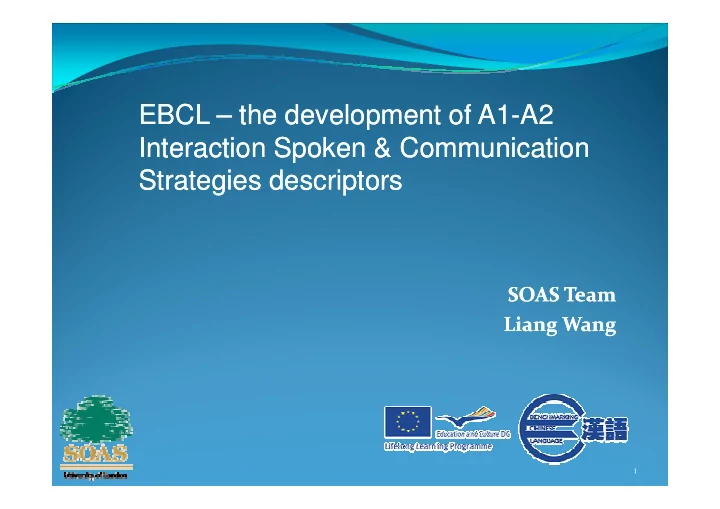

EBCL EBCL – – the development of A1 the development of A1-A2 A2 Interaction Spoken & Communication Interaction Spoken & Communication Strategies descriptors Strategies descriptors SOAS Team SOAS Team Liang Wang Liang Wang 1
EBCL Project Report – UK team � Revised A1/A2 level descriptors � Reception (5 categories) � Production (3 categories) Written � Interaction (3 categories) � Interaction (3 categories) � Strategies/Reception (1 category) � Reception (6 categories) � Production (5 categories) Spoken � Interaction (9 categories) � Strategies/Interaction (6 categories) 2
CEFR competence range (adapted from Zhang 2011) CEF Can-do Notions and functions Statements embedded in socio-cultural contexts C2 Notions Texts Operations C1 Sub-themes Notions Events Events B2 B2 Themes Notions Themes Notions Objects B1 Sub-themes Notions Persons A2 Notions Institution A1 Functions Sub-functions Functions Location Domains Personal Public Educational Occupational 3
IS and CS descriptor formulation � Based on CEFR descriptors (CDS) � Maintain the original CDS (coded) � Specify the CDS in terms of themes/topics and language functions � Modify where necessary: addition, deletion, insertion, split, etc. � Modify where necessary: addition, deletion, insertion, split, etc. � Re-position descriptors to a ‘proper’ sub-level � Justify by providing samples based on intuition and experience � Internal discussion and revision based on experience � Complementing with other relevant sources � European Language Portfolio � EAQULAS 4
Descriptors – Interaction Spoken (IS) Topic/Function-related CDS: � IS1 – Overall Spoken Interaction � IS2 – Understanding a Native Speaker Interlocutor � IS3 – Conversation � IS3 – Conversation � IS4 – Informal Discussion with Friends � IS5 – Formal Discussion and Meetings � IS6 – Goal-oriented Cooperation � IS7 – Transactions to Obtain Goods and Services � IS8 – Informal Exchange � IS9 – Interviewing and Being Interviewed 5
Descriptors – Strategies Solely function-related CDS, applicable to different topics in various scenarios: � Communication Strategy – Reception (CSR) � Identifying Cues & Inferring (Spoken & Written) Identifying Cues & Inferring (Spoken & Written) � Communication Strategy – Interaction (CSI) � CSI1 – Taking the Floor (Turn-taking) � CSI2 – Cooperating � CSI3 – Asking for Clarification � CSI4 – Planning � CSI5 – Compensating � CSI6 – Monitoring and Repairing 6
Descriptors – Interaction Spoken (IS) EBCL A1-A2 Interaction Spoken CDS (demo copy) Examples: � Solely function-related: C-IS1-A1.1-1 / E-IS1-A1.1-1 Can interact in a simple way but communication is totally dependent on repetition at a slower rate of speech, rephrasing and repair. (p1) dependent on repetition at a slower rate of speech, rephrasing and repair. (p1) � Modification (addition): C-IS1-A1.1-2 / E-IS1-A1.2-1 Can ask and answer simple questions, initiate and respond to simple statements in areas of immediate need or on very familiar topics (e.g. school, family, occupation) with interlocutor’s help . (p1) � Complementation: E-IS1-A2.2-4 Can handle short social exchanges and make oneself understood with help. [ELP-IS1-A2 n392-29.2002-CERCLES] (p3) 7
Descriptors – Interaction Spoken (IS) EBCL A1-A2 Interaction Spoken CDS (demo copy) Examples (continued): � Split of CEFR CDS into two EBCL CDS: C-IS2-A1.1-1 / E-IS2-A1.1-1 Can understand questions and instructions addressed carefully and slowly to him/her. (p3) addressed carefully and slowly to him/her. (p3) C-IS2-A1.1-1 / E-IS2-A1.2-2 Can follow short simple directions (e.g. getting at a location). (p4) � Re-position: C-IS2-A2.1-2 / E-IS2-A2.2 -3 Can be made to understand, if the speaker can take the trouble. (p5) � Addition: E-IS5-A2.1-2 Can understand and re-tell the main topic of a formal discussion on familiar topics . (p10) 8
Descriptors – Communication Strategies (CS) EBCL A1-A2 Communication Strategies CDS (demo copy) Examples: � Modification (rephrase): E-CSI3-A1.1-1 Can indicate that he/she understands or not. [ELP Descriptor No679-SI3-A1/19.2001-SWE] (p2) No679-SI3-A1/19.2001-SWE] (p2) � Complementation and translation: E-CSI3-A1.2-3 Je peux demander à quelqu'un d'épeler un mot que je ne comprends pas ou que je ne connais pas. [ELP Descriptor No678-SI3-A1/44.2003-FR/Coll.] Can ask someone to explain a word one does not understand or does not know. [translation] (p3) � Addition: E-IS5-A2.1-2 Can understand and re-tell the main topic of a formal discussion on familiar topics . (p10) 9
Discussion + Workshop Objectives To raise questions and to clarify points � To re-define some CDS (sub-)levels if applicable � To justify by examining the samples provided � To complement with items and samples To complement with items and samples � � Tasks Write down the unclear points when you read the file content on 1. the attached worksheet, using clear references to coded items. Work in small groups (3-4), discuss the suitability of CDSs and 2. their specifics; provide theme/topics/functions/samples where applicable (e.g. under-specified items). Round-up discussion and reporting. 3. 10
Recommend
More recommend